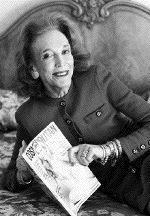“Don’t get mad, dahlink, get a younger man”
From the Sharon Dunn |
| ‘Don’t get mad, dahlink, get a younger man’ Ivana Trump is completely in control |
 [Photo: Kevin Van Paassen, National Post] Ivana Trump was in town to raise funds for the International Centre for Missing and Exploited Children. I first met Ivana Trump at the Polo Lounge in the Beverly Hills Hotel many years ago. She was still with The Donald then. As a matter of fact, it was about a week before the media got hold of the Marla Maples story. The Ivana I met at that time looked vulnerable and weak — it was obvious that something was wrong in her life. I recall that she ordered a shrimp cocktail and proceeded to pick at it, while The Donald ordered a big, juicy hamburger and fries and had no problem wolfing it down. Last week I saw Ivana for the first time since that day many years ago. It was all very formal. When I was finally escorted into the suite at the King Edward Hotel, Ms. Trump was already seated and poised for the interview. She looked confident and in control, not at all like the Ivana I had met before. “You have five minutes,” an assistant tells me. “Five minutes! This was supposed to be a meal,” I complain, thinking of walking out. I change my mind, deciding there can only be one princess here and Ivana has already assumed that role. Not wasting time, I decide to get right to it and ask her if she’s involved in a relationship.” Ms. Trump would rather not …” says the assistant.”So do you have a boyfriend?” I ask again, ignoring the publicist. “Yes,” she replies. I look toward the far end of the room where an exotic-looking, well-dressed young man is taking a seat in the corner. “Is he your lover?” I ask Trump. “Yes,” she answers bravely. I give the guy the once-over (we women do that, too, by the way). I know that Ivana is watching my reaction. “He’s much better-looking than any of your husbands,” I tell her. (She has been married three times.) With that she laughs, and I mean she really laughs. The publicist gives up. Trump is in town to lend her name and considerable marketing skills for the first annual Toast of Humanity, a charity involving members of the wine industry that this year is raising funds for the International Centre for Missing and Exploited Children. “Anything to do with the children has my attention,” she tells me. A savvy businesswoman and author, Trump is stunning in a beautiful black and sequined pantsuit. “It’s by a young Czech designer named Osming,” she says. She talks about her upbringing in Czechoslovakia. “When I was 13, I wasn’t a good student, and my parents were worried, so my father got me a job on the assembly line at the local shoe factory. After that I got straight As,” she laughs. She stresses the importance of discipline and focus in her life (starting from her days as a competitive skier), advising, “Don’t waste your life, don’t be like Scarlett O’Hara and think about doing it tomorrow. You have to follow up on your dreams, dare to be different.” Trump is a risk taker. Since she lives in New York, I ask her about 9/11. “I wasn’t afraid,” she tells me. “You have to live your life, not in fear. I fly American. I’m shocked and saddened [by what happened], but I’m not afraid.” She’s also a best-selling author. “Do you write your own books?” “I dictate them. I tell the stories to the writer,” she replies. Her two latest books are on entertaining and how to stay in business. “Then I read the material and make [verbal] changes.” Now that’s the way to write a book — no toiling over a computer for days, months, years on end! “I refuse to lie down and die,” she tells me, an indication that she must have struggled to get where she is. “I have education, health, I like to work. I always will be able to support myself and count on myself.” “Would you support a man?”, I ask. “It depends,” she tells me. I look at the suave and debonair fellow sitting quietly in the corner. “Are you and Ivana in love?” I ask him.”We’re not in love, we’re in Toronto,” he says, before smartly adding, “of course we’re in love.” His name is Rossano Rubicondi and he’s from Rome. Trump tells me that he is her “assistant.” (Way to go, Ivana, I think to myself.) And although he’s young, Rubicondi and Trump do not look incongruous together. As a matter of fact, I suspect he has, or soon will have, trouble keeping up with her, as opposed to the other way around. I ask Trump, who writes for Divorce Magazine and does an advice column for The Globe, if she still believes in marriage. “Yes, but it’s harder and harder to stay together, because we’re living longer, so people are living together longer. It used to be that 40 years together was long, but now people are married 60 years or more. It’s not that marriages are failing more,” she concludes, “it’s just that people are living longer.” “You’re definitely not the same woman I met at the Polo Lounge,” I tell her, as I get up to leave. She knows exactly what I mean. “Thank you,” she says. After the interview I mingle with the crowd as Trump and boyfriend make their grand entrance. At the sight of the boyfriend, one man rolls his eyes, “Young, isn’t he?” he whispers, “probably still in his twenties.” Another adds, “She wanted $25,000 for this event, but she only got $5,000.” Yet another man says cattily, “Donald’s got all the money, she’s got nothing.” It appears that some of the guys are threatened. How wonderful! And Ivana is out there, with her young, good-looking boyfriend, daring to be different, and making lots of money. More power to her! by Sharon Dunn |











